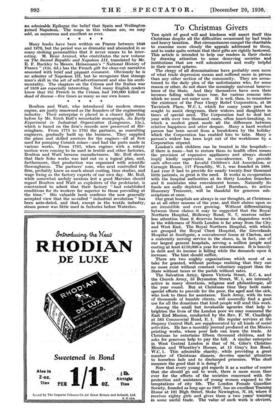Boulton and Watt, who introduced the modem steam engine, are
justly renowned as the founders of the engineering industry. Their enterprise is placed in a clearer light than before by Mr. Erich Roll's remarkable monograph, An Early Experiment in Industrial- Organization (Longman,- 15s.), which is based on the firm's records now preserved at Bir- mingham. From 1775 to 1795 the partners, as consulting engineers, gradually built up the business. They supplied the plans and skilled erectors for the engines—all at first used for pumping Cornish mines—and had the parts made in various works. From 1795, when engines with a rotary motion were coming to be used in textile and, other factories, Boulton and Watt became manufacturers. Mr. Roll shows that their Soho works was laid out on a logical plan, and, furthermore, that production was organized with scientific thoroughness. The partners' sons, who next controlled the firm, probably knew as much about costing, time studies, and wage fixing as the factory experts of our own day. Mr. Roll, while somewhat unduly anxious lest a good Marxian should regard Boulton and Watt as exploiters of the proletariat, is constrained to admit that their factory " had established conditions for its workers far superior to those prevailing at the time." His valuable book confirms the now generally accepted view that the so-called " industrial revolution " has been ante-dated, and that, except in the- textile industry, steam power was little used in factoriea before Waterloo..






































 Previous page
Previous page